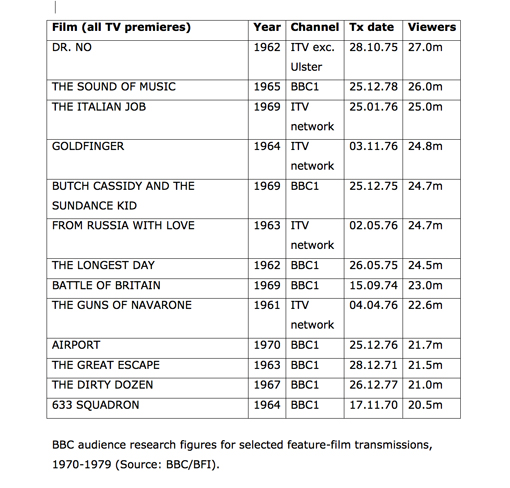Feature Films on British Television in the 1970s
In the interim, a pile of letters had been received by the IBA from viewers protesting at the alleged ban – some from adults, variously outraged, sarcastic or distressed, and in several cases pointing out the irony of the decision when a lot of ‘pornographic’ and violent films were being allowed on the air. One American viewer wrote a complaint in verse, which was answered by a poem from an IBA officer. But many letters were from children upset that their favourite star had been taken off the air. Among the dozens of letters – some clearly organised by schoolteachers, other apparently written at the volition of children as young as six – were several enclosing petitions with lengthy lists of names of children protesting the ban and asking that it be overturned; some mentioned surveys of classmates that the children had conducted (‘27 out of 28 voted Shirley Temple’). Some children made quite sophisticated critical remarks about ITV and hoped that it would go bankrupt or that the executives responsible would lose their jobs. The letters came from both boys and girls; all were in Shirley’s favour and pointed out how out of touch ITV was with real children’s tastes and interests. ‘I think your ITV chiefs are a bit cracked,’ wrote a sixteen-year-old boy (SR) from St Alban’s. ‘We love Shirley Temple…If you don’t think again I’ll be converted to the BBC. Long live the BBC.’ Other examples:
- ‘I think you were very wicked to ban Shirley Temple’s films…In one of the papers it said ‘Christine Jenkins, 9 of West Ham’, never heard of Shirley Temple. Well her mum doesn’t tell her or she isn’t interested in her films or she can’t read. (I hate her).’ (Miss K, 13 years – a four-page letter)
- ‘My friends and I are very, very wild with you. First you take off [the TV series] Planet of the Apes and then you ban the Shirley Temple films. It’s all very well for the ITV programme chiefs to laugh but they wouldn’t be laughing if they got sacked…I am not in the upper class because I am only a secondary school girl, but I have my own opinions and so do others.’ (CH, London)
- ‘I do not think you can know many little girls or else you would not make yourselves look so silly…I would like you to think again, stop being daft and put them back on again.’ (Caroline, 8, Andover)
Further investigation by the IBA revealed that the ‘ban’ was not what it seemed. One ITV company (Thames) had sought approval for a season of films in children’s viewing time on Thursday afternoons that included several Shirley Temple films. Two IBA programme officers ‘not happy’ about the choice of Temple but the option of including her films in future seasons if the present proposed one was a success was left open. This had been relayed by Thames’ programme planner to Leslie Halliwell as film buyer and to the distributor of the films, Warner Bros (on behalf of 20th Century-Fox), to explain why a package of thirteen Temple films was not going to be bought as planned. A ‘leak’ had then occurred to the Mirror. It was suspected that the unnamed executives quoted were figments and the quotations had most likely been made up. The source of the leak was suspected as being either Warners or Halliwell, but this was never proven. Despite the IBA’s repeated protestations that there was no ban across the network but simply a ‘no’ to the particular company and season concerned, the affair ran and ran, proving a considerable PR embarrassment, but did not stop Temple’s films being screened by ITV altogether.

Tentative Conclusion
At the beginning and end of the decade, two independent reports commented on what they saw as the disappointing state of the scheduling of films on British TV. The reports – by Ed Buscombe in 1971 for UNESCO and in 1979 by Lynda Myles, former director of the Edinburgh Film Festival and relayed specifically to the BBC – found that the broadcasters did not take the scheduling of films seriously enough and did not thereby encourage a serious interest in cinema by the public. Both used the word ‘camp’ to describe the attitude towards cinema frequently reflected in on-screen presenters and the Radio Times’ films column. This complaint does not, on the whole, seem to me to be warranted: the selection of films and their ‘placing’ seems far more reasonable and adventurous, within the limits of appealing to a generalised mass audience, than is the case today, for instance, despite the far greater availability of films across a far larger number of channels. Imaginative scheduling strategies, some of them quite risky, did take place and on the whole the viewing public as well as the cinema itself seems to me to have been well served.
Dr Sheldon Hall
 Learning on Screen
Learning on Screen